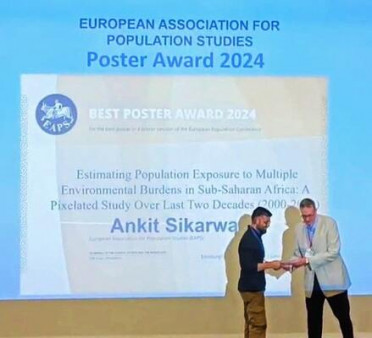Ankit Sikarwar
Ankit Sikarwar, a postdoctoral research fellow at INED, has been awarded the prize for the best poster presented at the European Population Conference (EPC), held in Edinburgh from 12 to 15 June 2024.
(Interview conducted in June 2024)
Could you explain the topic of your poster?
This poster highlights significant findings from our recent research on ‘Multiple Environmental Burdens (MEB)’ at Ined. By utilizing open-access geospatial data, our study identifies areas under simultaneous extreme environmental burdens, such as air pollution, temperature increases, drought, and scarcity of greenery. We also determine the number of people living in these high-burden areas using a 1km grid cell for analysis and measure changes over two decades. Importantly, we have adopted critical thresholds for measuring environmental risks that deviate from globally used standards. Our research also addresses a crucial question: Is the increase in exposure to MEB driven by population growth, the expansion of environmentally risky areas, or both? More details about this research can be found in our recently published open-access journal article.
Why did you choose to work on this topic?
Coming from a small town in India that has experienced tremendous environmental change due to unplanned tourism activities, I have always been interested in studying the complex connection of population and environment. My formal research using spatial data from satellite imagery and geospatial modelling began during my master’s studies. I have sought to understand the most effective methods for analysing unconventional satellite image data. Over the years, I have developed skills not only in utilizing geospatial data and techniques for my own research but also transferring these skills by teaching and training activities at international levels.
Apart from my interest in geospatial research, this particular research topic—Multiple Environmental Burden—is also inspired by a number of personal experiences I had during some voluntary field visits to the slums of Mumbai at the beginning of my Master’s and PhD studies. There, I observed and interacted with people living on a garbage dumping site who faced multiple environmental problems, such as smoke from garbage burning, water scarcity, informal housing, and unhygienic conditions. What surprised me was the way they had adapted to these challenges as a part of their daily lives. Since then, I have wanted to study these challenges and make a scientific contribution to this issue. Climate change and extreme events have increased everywhere and are affecting global well-being and health. Under such conditions, vulnerable populations (such as those living in slums) suffer more from the negative effects as they are less able to cope with these challenges and escape them. As a researcher, I believe there is a need for targeted policies and urgent action to mitigate these impacts. This study is a first step towards the empirical identification of populations that are at risk from multiple environmental burdens. In addition, my work with Valerie Golaz and the exchanges with the Demosud research unit members have been important learning experiences for me about sub-Saharan Africa.
How will this award contribute to your career?
Winning this award is incredibly significant to me, especially being selected from 74 outstanding research posters in the session. It has provided an opportunity to discuss my ideas with international scholars. For me, bringing attention to the concept of MEB within the research community was crucial, and I hope this award has helped highlight its importance to scholars worldwide. From a career perspective, this recognition adds to my early career achievements, enhancing my credentials and opening up further opportunities for collaboration and impact in my field. Moreover, I am excited to extend this research further.

